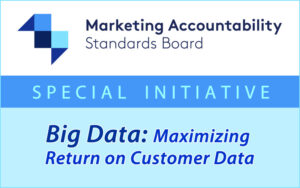The Marketing Accountability Standards Board (MASB) invites marketers to participate in a new research initiative on the use of “Big Data.”
WHY THIS IS A PR IORITY
IORITY
There is an urgent need to examine current practices and quantify the marketing and financial implications of the use of large sets of consumer/customer data, collectedly described as “Big Data.” The information age has ushered in an era of technologies for capturing, managing, and analyzing large amounts of customer data. Such data include retail scanner data, geodemo-graphic data, media use and online behavior, and unstructured data such as text, images and video, among others.
While there is little debate about the utility of such data, there are growing concerns about data integrity and representativeness. In addition, there are important issues around the structure of data and the degree to which structure is consistent with the needs for marketing planning and accountability. New analytics tools have emerged for use with big data that are evolving and, in some cases, are unproven. Concerns about privacy and current and potential regulation of the collection, use, and protection for consumer data (the advent of the “cookie-less world,” also has implications for the use of Big Data. This initiative is designed to identify current methods and procedures for the collection, structure, use, and analysis of Big Data and establish best practices with respect to the use of these data.
The objective is to equip marketers to be leaders in the use of Big Data within their organizations while identifying practices that clearly contribute the bottom line. Specific sub-initiatives related to unstructured data and the quality and accuracy of data, are planned as part of this.
WHAT WE PLAN TO DO
Big Data clearly has the potential to generate greater profits. McKinsey and Company studied its use in five different industries around the globe and found that it can increase operating margin by as much as 60%.*
Much of the benefit of Big Data for marketers has little to do with the identity of individual consumers. Rather, in many cases, its value arises from its ability to make firms more efficient. Some of these are more operationally related, others more marketing related. The ability to quickly summarize transactions, identify trends, and forecast future demand allows firms to be more responsive more quickly to markets.
Such responsiveness has two benefits: (1) it enables the firm to be where the action is faster than competitors, thus producing more sales and (2) it allows the firm to reduce the amount of unsold inventory that does not match demand.
It is also possible to conduct real time experiments to see what types of advertising and promotions work, improve those that do work and change those that do not, and repeat the process. Finally, new technologies provide a means for customer feedback about existing products and services and potential new products and services more quickly and far less expensively than ever before. As a result, products can, at least in theory, be improved and innovations created at a rapid pace.
Despite the obvious advantages of Big Data there are growing concerns about the degree to which it may be representative of the larger market, at least when restricted to data collected by any single organization. Data on current customers is useful may is not sufficient for planning activities involving current non-customers. Even data for current customers may be limited with respect to time, place, and type of interaction that produces the data.
The integrity and reliability of data is also a source of concerns given known differences in results obtained from different sources and the error(s) introduced by the existence of fraud. The potential utility of Big Data for use in marketing planning is also often limited by data structures that are designed for other purposes, such as accounting, billing, and inventory tracking, among others. At minimum, this makes data more difficult and expensive to apply in the context of marketing decision-making and, in the worst case, makes the data usable for marketing decision makers. Finally, various tools for analysis, both existing and emerging, remain to be proven and/or lack clear standards for best practice.
To date, four specific projects have been identified within the context of this broad agenda:
- analysis of unstructured data
- data quality
- linking data to financial performance
- applications of machine learning and artificial intelligence.
PARTICIPATE!
We are now recruiting Marketers to participate in this MASB-sponsored initiative. The benefits are clear. Participants will have the opportunity to identify how to apply Big Data to drive greater revenues, profits, and financial value, gain competitive advantage and increase their market share.
To schedule a meeting to discuss participation, contact MASB Executive Director Frank Findley, frankfindley@themasb.org.
*The McKinsey study can be found at: mckinsey.com/insights/business_technology/big_data_the_next_frontier_for_innovation
